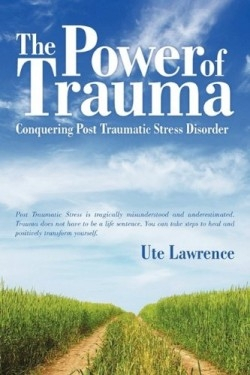The Power of Trauma
Conquering Post Traumatic Stress Disorder
On the Friday before Labor Day in 1999, Ute Lawrence and her husband Stan were headed to a business meeting in Michigan, traveling down one of Canada’s busiest multi-lane highways. They never made it.
They were at ground zero of an eighty-seven-vehicle pile-up, an inferno of heat and flames that would become the worst accident in Canadian history. Dense fog was blamed for the eight deaths and forty-five injuries.
Physically, the couple walked away with just a few scratches. Mentally, Lawrence was changed forever. This is the story of her search for the truth about the changes in her behavior following the accident, her realization that she was suffering from Post Traumatic Stress Disorder (PTSD), and how she’s succeeded in overcoming it.
“I always believed that I could handle everything that came my way, good or bad,” writes Lawrence, who ran a highly successful magazine business for twenty-two years. But she eventually realized that PTSD was something she couldn’t handle on her own. “I was numb. I just sat at my desk, unable to think, let alone concentrate,” she writes. Her search for answers led her to various treatments and programs that helped her “come back and move on.”
She shares these therapies, with the caveat that she is not a medical professional and that the information is based on her own experiences and research.
The therapies include EMDR (“eye movement desensitization and reprocessing”), cognitive behavioral therapy, HeartMath, and positive psychology. She presents information about each; for example, using the HeartMath “tool” of freeze-frame, patients learn to recognize the stressors that lead to anxious symptoms and then try to replace them with more positive feelings.
Additional chapters deal with three other individuals who were suffering after dissimilar traumatic events, the necessity of uncluttering your material life (“a positive move to simplify your life”), and sustaining yourself beyond the event.
Lawrence writes in a friendly, conversational tone—never condescending, always cheerful and encouraging.
A self-assessment checklist for PTSD is included in the back pages. This book may serve as a starting point for readers who are questioning whether they might still be affected by a traumatic event.
Readers will also discover some good life-affirming messages here. Because of her brush with death and the ensuing PTSD, Lawrence founded the first civilian Post Traumatic Stress Disorder Association in North American three years ago. It “provides access to information about PTSD and a referral system found lacking in many areas of medicine.” She’s also a speaker and presents information on the Power of One Discovery series, a program that helps individuals with personal and business growth.
Her ultimate wisdom is this: “What it boils down to is trusting what is right in your life and building on it.”
Disclosure: This article is not an endorsement, but a review. The publisher of this book provided free copies of the book and paid a small fee to have their book reviewed by a professional reviewer. Foreword Reviews and Clarion Reviews make no guarantee that the publisher will receive a positive review. Foreword Magazine, Inc. is disclosing this in accordance with the Federal Trade Commission’s 16 CFR, Part 255.

